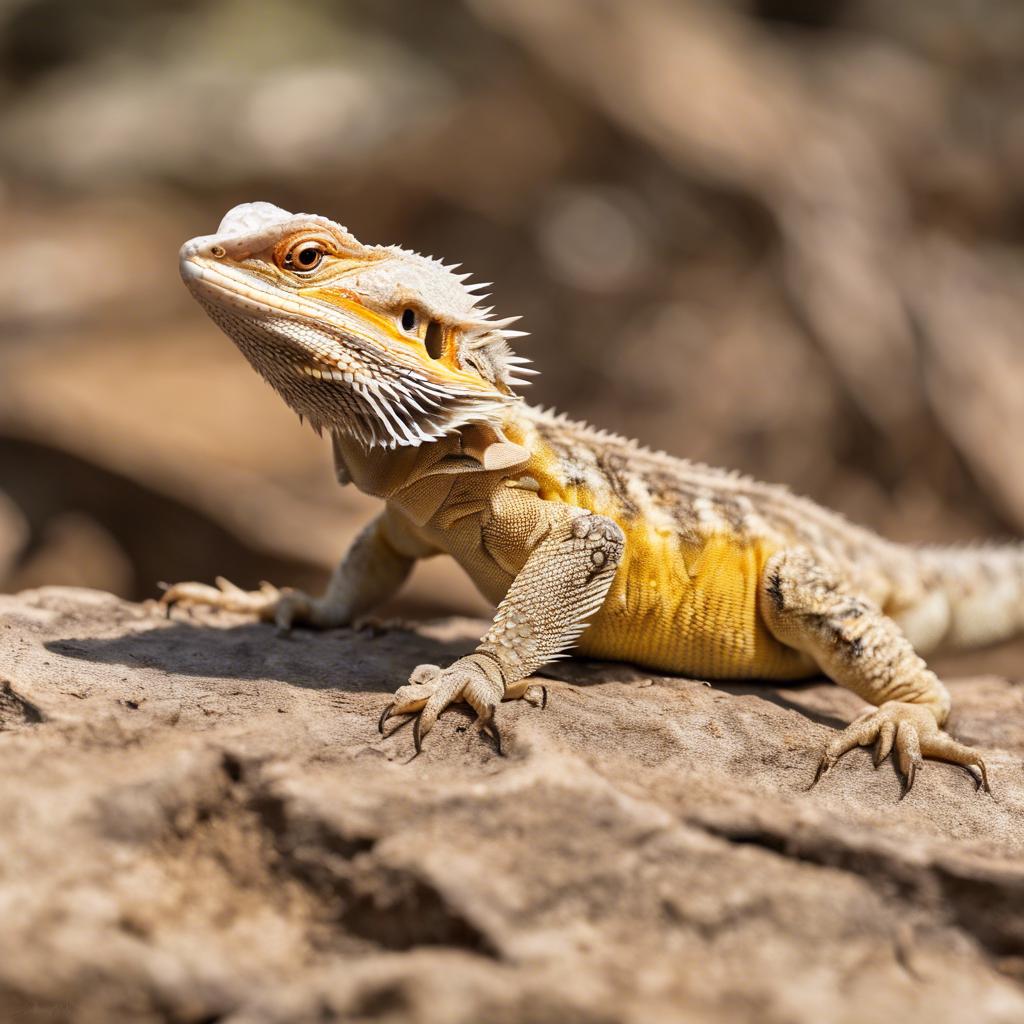Bearded dragons, scientifically known as Pogona, are a type of lizard native to Australia. They have become increasingly popular as pets due to their docile nature and unique appearance. Bearded dragons are known for their spiky appearance, which is where they get their name from. They have a triangular-shaped head and a beard-like flap of skin under their chin that they can puff up when they feel threatened or excited.
These reptiles are relatively easy to care for and can make great pets for both beginners and experienced reptile enthusiasts. They are known for their friendly and curious nature, making them enjoyable companions. Bearded dragons are also highly adaptable and can thrive in a variety of environments, including both indoor and outdoor enclosures.
Key Takeaways
- Bearded dragons are popular pets that require a balanced diet and proper care.
- Wasps are not a recommended food source for bearded dragons due to potential risks and allergic reactions.
- Signs of allergic reactions in bearded dragons include swelling, difficulty breathing, and lethargy.
- Alternative food options for bearded dragons include crickets, mealworms, and vegetables.
- Maintaining a healthy habitat and monitoring for common health issues is crucial for the well-being of bearded dragons.
Bearded Dragon Diet and Nutrition
A proper diet is crucial for the health and well-being of bearded dragons. In the wild, they are omnivorous, meaning they eat both plant matter and insects. Their diet consists mainly of leafy greens, vegetables, fruits, and a variety of insects such as crickets, mealworms, and dubia roaches.
It is important to provide a balanced diet that meets their nutritional needs. Leafy greens such as collard greens, mustard greens, and dandelion greens should make up the majority of their diet. These greens are high in calcium, which is essential for their bone health. Vegetables such as squash, bell peppers, and carrots can also be included in their diet.
In addition to plant matter, bearded dragons require a source of protein from insects. This can include crickets, mealworms, dubia roaches, and occasionally pinky mice for adult dragons. It is important to gut-load the insects before feeding them to your bearded dragon to ensure they are receiving proper nutrition.
Can Bearded Dragons Eat Wasps?
While bearded dragons are known to eat a variety of insects, including wasps, it is generally not recommended to feed them wasps. Wasps can be potentially harmful to bearded dragons due to their venomous sting. The venom can cause an allergic reaction or even lead to anaphylactic shock in some cases.
Some people may consider feeding their bearded dragons wasps as a source of enrichment or to provide a varied diet. However, the risks associated with feeding them wasps outweigh the potential benefits. It is always best to err on the side of caution and stick to safe and nutritious food options for your bearded dragon.
Potential Risks of Feeding Bearded Dragons Wasps
Feeding bearded dragons wasps can pose several risks and dangers to their health. The venom from a wasp sting can cause an allergic reaction in bearded dragons, leading to symptoms such as swelling, difficulty breathing, and even death in severe cases. Bearded dragons have a relatively small body size compared to humans, making them more susceptible to the effects of venom.
In addition to the risk of allergic reactions, wasps can also carry parasites and diseases that can be harmful to bearded dragons. Feeding them wild-caught insects, including wasps, increases the risk of introducing these parasites and diseases into their system.
It is important to prioritize the health and safety of your bearded dragon by providing them with a diet that is free from potential risks and dangers.
Signs of Allergic Reactions in Bearded Dragons
It is important to monitor your bearded dragon's health and behavior for any signs of allergic reactions. Some common signs of allergic reactions in bearded dragons include:
1. Swelling: Swelling around the face, limbs, or body can indicate an allergic reaction.
2. Difficulty breathing: If your bearded dragon is struggling to breathe or gasping for air, it may be experiencing an allergic reaction.
3. Lethargy: A sudden decrease in activity level or energy can be a sign of an allergic reaction.
4. Changes in appetite: Loss of appetite or refusal to eat can indicate an allergic reaction.
5. Skin irritation: Redness, rash, or other skin irritations can be a sign of an allergic reaction.
If you notice any of these signs or suspect that your bearded dragon may be experiencing an allergic reaction, it is important to seek veterinary care immediately.
Alternative Food Options for Bearded Dragons

Instead of feeding your bearded dragon wasps, there are plenty of safe and healthy alternative food options available. These include a variety of insects, leafy greens, vegetables, and fruits.
In terms of insects, crickets, mealworms, dubia roaches, and silkworms are all excellent options. These insects provide a good source of protein for your bearded dragon. It is important to gut-load the insects before feeding them to your dragon to ensure they are receiving proper nutrition.
Leafy greens such as collard greens, mustard greens, dandelion greens, and kale should make up the majority of their diet. These greens are high in calcium and other essential nutrients. Vegetables such as squash, bell peppers, carrots, and sweet potatoes can also be included in their diet.
Fruits should be fed in moderation due to their high sugar content. Some safe fruit options for bearded dragons include berries, melons, and apples.
Proper Care for Bearded Dragons
Proper care and maintenance are essential for the health and well-being of bearded dragons. This includes providing a suitable habitat and environment for them to thrive.
Bearded dragons require a spacious enclosure with adequate heating and lighting. The enclosure should have a temperature gradient with a basking spot that reaches around 95-105°F (35-40°C) and a cooler area around 75-85°F (24-29°C). UVB lighting is also essential for their overall health and calcium metabolism.
The enclosure should be furnished with hiding spots, branches, and rocks for climbing, and a shallow water dish for drinking and soaking. It is important to provide a substrate that is safe and easy to clean, such as reptile carpet or ceramic tiles.
Maintaining a Healthy Habitat for Bearded Dragons
Maintaining a clean and healthy habitat is crucial for the well-being of your bearded dragon. Regular cleaning and proper hygiene practices are necessary to prevent the buildup of bacteria and parasites.
The enclosure should be spot-cleaned daily to remove any feces or uneaten food. A thorough cleaning should be done at least once a month, where the entire enclosure is cleaned with a reptile-safe disinfectant. This includes removing all substrate, cleaning all surfaces, and replacing any furnishings that cannot be properly cleaned.
It is important to provide fresh water daily and clean the water dish regularly to prevent the growth of bacteria. Bearded dragons also require regular baths to help maintain their skin health and hydration.
Common Health Issues in Bearded Dragons
Bearded dragons are generally hardy reptiles, but they can still experience health issues. Some common health issues that bearded dragons may experience include:
1. Metabolic bone disease: This is a common condition in bearded dragons caused by a lack of calcium or improper calcium metabolism. It can lead to weak bones, deformities, and other health problems.
2. Respiratory infections: Bearded dragons can develop respiratory infections if they are kept in damp or dirty conditions. Symptoms include wheezing, coughing, and difficulty breathing.
3. Parasites: Bearded dragons can be susceptible to internal parasites such as worms or external parasites such as mites. Regular fecal exams and preventative measures can help prevent and treat these issues.
4. Impaction: Bearded dragons can develop impaction if they ingest substrate or other foreign objects. This can lead to blockages in their digestive system and require veterinary intervention.
Regular check-ups with a reptile veterinarian are important to ensure the overall health and well-being of your bearded dragon.
Should You Feed Your Bearded Dragon Wasps?
In conclusion, it is not recommended to feed your bearded dragon wasps due to the potential risks and dangers associated with their venomous sting. Wasps can cause allergic reactions and pose a threat to the health and well-being of your bearded dragon.
Instead, it is best to provide a balanced and varied diet that includes a combination of leafy greens, vegetables, fruits, and a variety of insects. This will ensure that your bearded dragon receives all the necessary nutrients for optimal health.
Proper care and maintenance, including providing a suitable habitat, regular cleaning, and monitoring your bearded dragon's health, are also essential for their overall well-being.
By prioritizing their health and providing them with a safe and nutritious diet, you can ensure that your bearded dragon lives a long and healthy life as your beloved pet.
If you're wondering whether bearded dragons can eat wasps, you might find the article “Can Bearded Dragons Eat Wasps?” on Reptile Wizard's website interesting. This article explores the potential risks and benefits of feeding wasps to bearded dragons, providing valuable insights for reptile owners. To learn more about this topic, click here.
FAQs
Can bearded dragons eat wasps?
No, it is not recommended to feed wasps to bearded dragons as they can be harmful to their health.
Why are wasps harmful to bearded dragons?
Wasps can sting bearded dragons, causing pain and potential allergic reactions. Ingesting wasps can also lead to digestive issues and blockages.
What should bearded dragons eat instead of wasps?
Bearded dragons should primarily eat a diet of insects, such as crickets, mealworms, and dubia roaches. They can also eat vegetables and fruits as supplements.
Can bearded dragons eat other types of insects?
Yes, bearded dragons can eat a variety of insects, including but not limited to: crickets, mealworms, dubia roaches, superworms, and hornworms.
What should I do if my bearded dragon accidentally eats a wasp?
If your bearded dragon accidentally eats a wasp, monitor them closely for any signs of discomfort or illness. If they show any symptoms, such as vomiting or lethargy, contact a veterinarian immediately.

